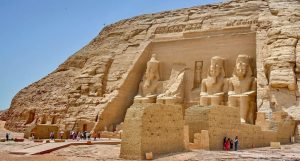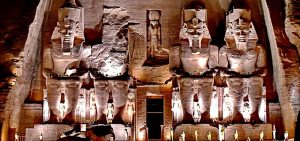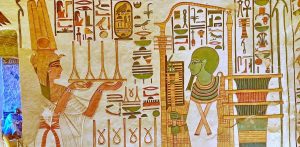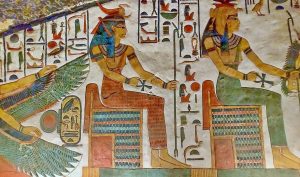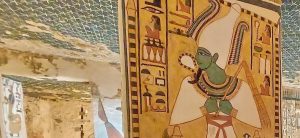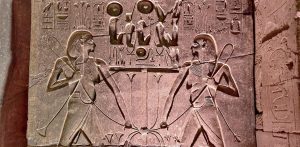Because Egypt’s temperature is continental (dry and hot in the summer, warm and chilly in the winter), it’s best to carry light clothing (shirts, T-shirts, and shorts), with two long-sleeved items; and if visiting in the winter (December to March), don’t forget to include a windbreaker. In the early mornings and late evenings of winter, you may require a sweater because it is typically cool and even becomes colder.
Sand and desert are the main features of the most popular tourist destinations, thus leather shoes are not advised for the excursion.
Trousers and shirts should be worn at 5* hotels and on Nile Cruises, especially around dinner time, and no slippers should be worn.
Women should avoid wearing sleeveless tops or shorts when in Egypt to show respect for our culture, but they can wear anything they like while touring because the majority of the people surrounding them are tourists.
Men, on the other hand, have nothing to do with Egyptian culture as long as they wear at least shorts, but they will appear to be genuine tourists, which is OK except that you may attract merchants and problems on the street.
Egyptian Visa requirements, Passport Registration:
Visa requirements: Visas may be obtained for $15 USD at Egyptian airports for a duration of one month for most nations. What you should do on arrival is go to the bank and buy two stamps to insert in your passport before going through customs. We usually hire a firm to assist us with the Visa application.
Passport registration: It is mandatory to register your passport during your first week in Egypt, but don’t worry; it is usually done by your hotel within the first 24 hours of your visit.
Egyptian Currency, Banks, Credit Cards:
The Egyptian pound (“EGP” stands for Egyptian pound, or “LE” stands for the French word “Libre Egyptien”) is the country’s official currency. 100 piaster equals 1 EGP. It is not advisable to convert money in an airport bank since the rates are slightly lower than in metropolitan banks. Remember to bring some one-dollar notes with you because they are accepted virtually everywhere in Egypt.
Banks are closed on Fridays and Saturdays but are open five days a week from 8:00 a.m. to 4:00 p.m.
Credit cards: Can be used nearly anywhere in large cities, and are accepted in almost all stores and hotels; the only exception is American Express, which is not accepted for payment of Nile Cruises in Egypt if there are any extra costs.
Power and Electricity in Egypt:
The two-pronged type of wall plug is the most common. The voltage is 220 volts and the frequency is 50 cycles per second. Be warned that charging your camera or phone on a sleeper train is not recommended since the electricity is unstable and may cause harm to your gadgets. However, if you have the correct charger, you may charge it in your tour bus or van.
Shops And Pharmacies In Egypt:
Shops: The majority of the stores are open from 10:00 a.m. to 11:00 p.m. Downtown and the Khan El-Khalili Gold and Silver Shops are closed on Sunday. Muslim-owned businesses are closed on Fridays from the start of the prayer to the completion of the prayer. On Sundays, all stores owned by Coptic Christians are closed for the whole day.
Pharmacies: Open from 10:00 a.m. to 12:00 a.m., only a few of them are open 24 hours, notably those on important streets and in congested neighborhoods.
Call Emergency:
Ambulance: Tel: 123
Police: Tel: 122
Fire: Tel: 125
Water, Drinks And Food In Egypt:
Water: It is not advised for a tourist to drink the Nile water in Egypt; it is extremely highly treated, which means it is safe to drink for Egyptians; nevertheless, as a visitor, you must become accustomed to it before considering using it to brew a cup of tea or coffee. You won’t have to worry because inexpensive mineral water bottles can be found all across Egypt.
Beverages: Try Egyptian drinks like Sugarcane juice, Hibiscus (Karkade) tea, and Doam juice while you’re in Egypt; they’re delicious and nutritious.
Be advised that in Egypt, all beverages and water are typically not included with the meals you order, with the exception of tap water, which is absolutely free. In the hotels, tea and coffee are offered with breakfast as part of your meal.
Food: Beef, chicken, or fish are the major ingredients in Egypt’s main daily meals of lunch and supper. In the hotels and on the Nile Cruises, you may get rice, spaghetti, or fries to finish your meal, along with your favorite salad. Hotels provide cheese, honey, boiled eggs, and omelets for breakfast, as well as beans, yogurt, green salad, bread, Pita bread, and fruit salad. Brown beans, falafel, eggplants, green paper, chips, green salad, and pita bread are popular among Egyptians.
To speak of Egyptian cuisine, it is important to understand that it is quite weak since we have only a few creations in this sector, such as Koshari, which is a mixture of pasta, spaghetti, rice, fried onion, chickpeas, and lintel, with tomato sauce, salt, and vinegar. And one of our most popular meals is Mah’shi or Dolma, which is basically cabbage, grape leaves, eggplants, or even green paper filled with rice, and can be found at tourist restaurants or on Nile cruises as part of the salad menu.
Shish Kebab and Shish Tawook are popular in Egypt; locals refer to them as Egyptian, yet they are Turkish in origin.
Fast food restaurants in Egypt:
Fast food restaurants may be found in all of Egypt’s main cities, including Cairo, Alexandria, Luxor, Aswan, Hurghada, Sharm El-Sheikh, and the governorates.
Fast food restaurants in Egypt
International chains
Pizza hut: Tel: 19000
Roma Pizza 2 Go: 19914
La Cassetta: Tel: 02-22618151
Little Ceaser : Tel: 02-6074
Fish Market: Tel: 02-35709694
Dominos Pizza: Tel: 19223
Chillis: Tel:02-761 7004
T.G.I Fridays: Tel: 02-761 1113
Fuddruckers: Tel: 16226
KFC: Tel: 19019
MC Donald’s: Tel: 19991
Hardees: Tel: 19066
Burger King: Tel: 02-24802474
Egyptian Chains
Pizza king: Tel: 19519
Pizza Alex: Tel 16008
Cook Door: Tel: 16999
MO’men: Tel: 16600
Smiley’s: Tel: 02-692 30 71
My Queen: Tel: 02-37491655
Wessaya: Tel: 19303
Tomatoes: Tel: 16999
Al-Tazej: Tel: 19018
Shawerma El Rim: Tel: 02-22755115
Jaar Al kamar: Tel: 02-37499460
Egyptian food Restaurants
Abou El-sid: Tel: 02-23805050
Citadel View Restaurant, Cairo: Tel: 02-3467757
Akher Saa: Tel: 19550
El-Tabie El-Domyati: Tel: 16015
FelFela: Tel: 02-3761234
El-Shabrawy: Tel: 16919
Egyptian food bank: Tel: 16060
Korean, Thai, Chinese, and Japanese food restaurants
Koloon Korean, Chinese: Tel: 02-25759831 New China: Tel: 02-9 228-9939
Transportation, Taxi, buses, Service vans, Trains, and River buses:
Taxis: Each city has its own taxi color, and while few of them use the meter, costs are fair if negotiated before entering (Uber is available with a few other taxi companies)
Buses: In big cities, street buses are a common and inexpensive mode of public transit. For lengthy trips, buses between cities are of a better grade, featuring a washroom and a waiter.
Public usage of service vehicles for 75 piasters and some for one pound is quite common. For a tourist, it is a once-in-a-lifetime opportunity.
Trains are the safest mode of transportation in general. It is worth paying more for first-class seats because they are more comfortable and the price is acceptable. Soft and hot beverages, sandwiches, and snacks are served by a trolley waiter.
Sleeper trains are the greatest, and they’re run by Abella Egypt. Cabins are cramped but well-kept, and beds are stacked on top of each other (bunk beds). The luggage storage area is located above your bed. In every single cabin, there is a wash sink with hot water available. A/C, music, and light control are all available. Families can stay in two neighboring cottages. In the cabin, cooked supper and breakfast are included in the ticket fee. Aside from coffee or tea with breakfast, no additional beverages are offered. If you are not traveling with a guide, a conductor tip is required, therefore make sure you have enough 1 LE banknotes on you.
Metro: Only in Cairo, it is well-organized and follows a rigorous schedule. If it passes through locations you wish to see, don’t miss it. The price is quite reasonable. 7 LE is the ticket price.
River Buses: In Cairo, the public utilizes river buses to traverse the Nile. Tourists can utilize it to go to nearby attractions such as the Giza Zoo, Cairo University, or any of the Nile hotels.
Geography & Distances between cities:
Egypt lies in the northeast corner of Africa, while Sinai, a portion of Egypt, is in Asia. Egypt is a one-million-square-kilometer African Asiatic country. There are several domestic flights available for travel between cities. The best among them are Flash Airlines, Memphis Airlines, and Egyptair. Traveling between Cairo and Luxor/Aswan via sleeper train is an option.
Cairo – Aswan: 13 hours by train – one hour 20 minutes flight.
Cairo – Luxor: 10 hours train – 50 Minutes flight.
Cairo – Hurghada 6 hours drive (no train available) – 35 minutes flight.
Cairo – Sharm: 7 hours drive (no train available) – 40 minutes flight.
Cairo – Alexandria – 2 hours train 3 Hours Drive
Cairo – Suez Canal – 2 hours drive.
Cairo – St.Catherine – 6 hours drive.
Cairo – Fayoum – 90 minutes drive.
Cairo – Menya 4 hours drive.
Cairo – Baharia 4 hours drive.
Cairo – Kharga 7.30 hours drive.
Luxor – Aswan – 4 hours drive or 3 hours train.
Aswan – Abusimbel – 30 minutes flight or 3.30 hours drive.
Luxor – Abydos – 2 hours drive.
Luxor – Hurghada – 4 hours drive
Alcohol, Washrooms, & Baksheesh (Tipping):
Alcohol: Because religion has such a strong impact in Egypt, most hotels and tourist restaurants serve alcohol. It is advisable to check the pricing before ordering because alcohol is pricey. It is available at free-duty stores for a fair price. You are welcome to drink it in your room.
Tissues and little Egyptian knots of 50 piasters and one-pound coins are extremely helpful in public washrooms because they are not very clean and do not give toilet paper; nevertheless, there is usually an attendant who will provide a napkin to wipe your hands for a modest tip.
Baksheesh (Tipping): In Egypt, tipping (or Baksheesh) is a common habit (even among Egyptians) that assures extra services at monuments, museums, and other attractions. It’s inconvenient, but it’s part of the Egyptian way of life. If you don’t require the services, politely but firmly decline.
If you’re traveling with a guide, find out where tipping is required before you go. They usually take care of any baksheesh on the job sites, as well as any included meals and so on. When the guide is not with you, you should keep 1LE notes on hand for tipping baggage, housekeeping, washrooms, and other incidental services.
At the end of your stay with them, it is typical to tip your guide and driver around $3-$5 US per day per person for the driver and $20-$50 US per day per person for the guide – these amounts are per person, and the same goes for cabin service and waiters on cruise ships. The ideal method is to put the tip in an envelope with a small message if appropriate and deliver it to them in person at the end of their service. Note that, while tipping is normal and expected, the amount you tip and whether you tip is totally up to you.
If you wish to bring something to give to the youngsters when the time comes, pens or candy are common choices.
Hotels & Nile Cruise Categories:
We are often asked what Hotels we use and what is the difference between 3*/4*/5* stars – so we have tried to explain this here.
3*Star – Tourist – clean hotel with no frills, private bathroom, mainly Egyptian family-owned.
4* Star – Superior Tourist – more amenities than the 3* like restaurants and pools. Some Egyptians owned some Western management Chain Hotels like the Novotel in Luxor.
5* Star – First Class – Major Chain hotels in Cairo i.e. Hilton, Meridien, Sheraton either on the Nile or by the Pyramid. In Hurghada, there are major resorts overlooking the water with private beaches and lots of facilities, and large swimming pools.
Cruise ships: – We use only 4*/5* Star Cruise ships. All cabins are outside cabins with private facilities.
Drugs, Crime, & Smoking In Egypt
Drugs:
Drugs are strictly prohibited and the consequences for use can be very severe. Don’t even consider it.
Crime:
Crime is low, rape rare, Aids is almost nonexistent, arguments may flare up over a traffic violation, but are usually over quite quickly. Family feuds are more common than any form of crime. It is safe to walk the streets at any time of day, like all cities you should be cautious and attentive to your whereabouts.
Smoking:
Smoking is quite prevalent, although it is banned in all food restaurants. If you are a smoker yourself you might want to try smoking the water pipe (Shesha) in one of the many street cafes.
Customs, Culture, & Shopping In Egypt
Customs & Culture:
The population is made up of mainly Moslems and Coptic Christians. The main day of worship is Fridays, which is their weekend holiday. Government offices, Institutions, and Banks close Fridays and Saturdays.
The food is varied, chicken and lamb are popular, as is rice, pasta, beans, and Pita bread. Tea (Shai) is the main drink of the Egyptians and is served frequently with mint.
Egyptians keep themselves and their homes very clean. Litter is a problem, particularly in the poorer areas where solid waste disposal is lacking. The noise level in parts of the Cities is quite high, and Cairo, in particular, is a 24-hour city when most stores and activities going on around the clock non-stop.
It is common to form of greeting to see men or women holding hands, linking arms, and embracing on the cheek with others of the same sex. This is their culture and there are no sexual overtures to it. Men and women do not show affection to each other in public. It is acceptable to hold, or link arms with your partner in public, but that is it. To be on the safe side, and so as not to offend, it is best to follow what you see, Kissing and hugging your partner or boy/girlfriend is not appropriate in public.
Shopping:
Cairo is a shopping adventure. Buy brass, copper, and inlaid wooden articles, silver and gold jewelry, leather shoes, bags and belts, cotton goods, and perfumes. Have a gold cartouche made with your name written in hieroglyphics. Be sure that the letters are soldered and not glued on. Have a kaftan of pure Egyptian cotton tailor-made in two days. Shop at the Khan El Khalili Bazaar for better variety, interesting and artistic goods. You should be able to bargain prices that were originally quoted to you.
Telephone, Cell phones In Egypt
The Telephone system in Egypt is overloaded and antiquated. 4/5 Star Hotels will have direct line dialing and international service. Some hotels have data ports and even their own Internet Cafes, or you can hook up your laptop directly to the phone if you have an ISP service you can use.
Calling cards through an International Operator (AT & T etc) or credit cards can be used for calling. They do have calling cards available for sale everywhere to be used in the local call boxes, which are usually two different types. Directions may not always be in English.
There are Internet Cafes in all the major cities – Cairo/Luxor/Aswan/Alexandria/Hurghada,
They usually range from $3 to $6 US an hour, with a minimum 15-minute charge. However, the ISP’s are not as reliable and it is sometimes difficult to get on particularly in the evening, and it’s not unusual to get booted off.
Cell phones are everywhere in Egypt, it has one of the highest usages for cell phones in the world, which makes sense as their Telephone system can’t keep up with the regular phone requirements. They have international cell phone service, and it covers just about everywhere, even the most remote areas. Outgoing calls are quite expensive, but in most cases, there is no charge for incoming calls. If renting independently, check all the charges ahead of time.
Happy Travels!!

